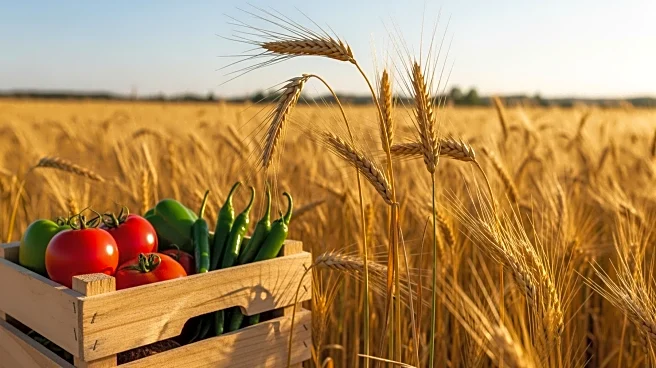What's Happening?
The Central Bank of India organized an agriculture credit outreach campaign in Vemuru village, Bapatla district, on Friday. The event was led by E Venkateswara Rao, the regional head of the bank's Cuddapah Region. The campaign received significant attention
from the public, particularly members of Self-Help Groups (SHG). Key figures such as MPDO Ravikumar, MAO Prem Sagar, APM of Vemuru K Sobhan, chief manager BK Prasad, and branch manager Gnana Soundari were present. During the event, claim settlement cheques from the Pradhan Mantri Jeevan Jyothi Bima Yojana were distributed to legal heirs. The campaign successfully disbursed over Rs 25 crore in agriculture loans, with similar initiatives conducted by other branches in the Cuddapah Region.
Why It's Important?
This outreach campaign is crucial for enhancing financial inclusion in rural areas, particularly for farmers and SHG members who often face challenges in accessing credit. By disbursing substantial agriculture loans, the Central Bank of India is supporting local agricultural development and economic growth. The distribution of claim settlement cheques under the Pradhan Mantri Jeevan Jyothi Bima Yojana also highlights the bank's commitment to providing financial security to families. Such initiatives can lead to increased agricultural productivity and improved livelihoods, contributing to the broader goal of rural economic empowerment.
What's Next?
The success of this campaign may encourage the Central Bank of India to expand similar outreach programs to other regions, potentially increasing the availability of credit to more farmers and SHG members. This could lead to further collaborations with local government officials and community leaders to ensure effective implementation and monitoring of loan utilization. Additionally, the bank might explore partnerships with other financial institutions to enhance the reach and impact of these campaigns.
Beyond the Headlines
The campaign underscores the importance of financial literacy and education in rural communities, which can empower individuals to make informed decisions about credit and insurance products. It also highlights the role of banks in fostering community development and supporting government initiatives aimed at financial inclusion. Long-term, such efforts could contribute to reducing rural poverty and bridging the urban-rural economic divide.

















